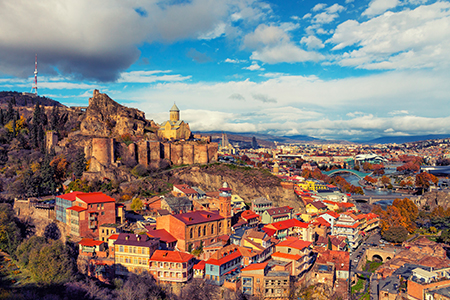Tbilisi hosts first working meeting with 100 Resilient Cities network

Tbilisi is among one hundred global cities to have joined the 100 Resilient Cities network (100RC) against the "intertwined forces of globalization, urbanisation and climate change that are putting pressure on cities like never before”.
Cities in the network include Paris, London, Buenos AIres, Rio de Janeiro, New York City, Washington DC and others.
Since December 2013, the Rockefeller Foundation has been assisting cities around the world under the framework of its 100RC network to become more resilient to the physical, social and economic challenges facing large metropolitan centers today.
Having joined the 100RC in May 2016, Georgia’s capital Tbilisi is now hosting its first working meeting.
With USD 1 million from the foundation, Tbilisi Mayor Davit Narmania believes the city will be able to bolster its ability to respond to natural disasters.
Tbilisi is the one and only city in Eastern Europe and the post-Soviet space that has joined the network”, Narmania said.

Tbilisi Mayor Davit Narmania addresses the participants of the first working meeting. Photo by: Mayor's press office
Aging infrastructure, earthquake, landslide, rainfall flooding, poor air quality/pollution are some of the resilience challenges Tbilisi is facing nowadays. As the member of this global network Georgia’s capital will be provided with:
- Expert support for the development of a robust resilience strategy;
- Access to solutions, service providers, and partners from the private, public and NGO sectors who can help them develop and implement their resilience strategies;
- Membership of a global network of member cities who can learn from and help each other.
About 100 Resilient Cities
Per 100 Resilient Cities’ official website
"100RC supports the adoption and incorporation of a view of resilience that includes not just the shocks—earthquakes, fires, floods, etc.—but also the stresses that weaken the fabric of a city on a day to day or cyclical basis.
Examples of these stresses include high unemployment; an overtaxed or inefficient public transportation system; endemic violence; or chronic food and water shortages. By addressing both the shocks and the stresses, a city becomes more able to respond to adverse events, and is overall better able to deliver basic functions in both good times and bad, to all populations.
Through these actions, 100RC aims not only to help individual cities become more resilient, but will facilitate the building of a global practice of resilience among governments, NGOs, the private sector, and individual citizens.”
 Tweet
Tweet  Share
Share